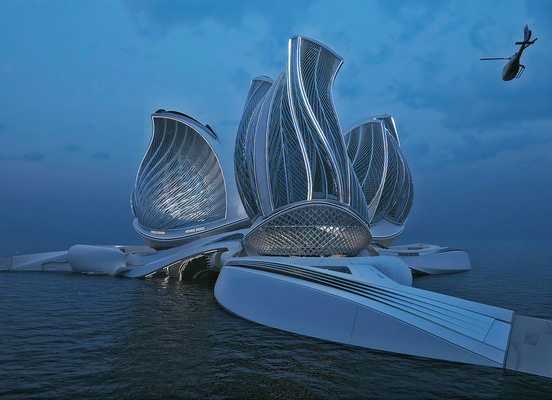
Our students Lucia Leskovjanská and Katharine Anna Kuzma interviewed Ms. Lenka Petrakova, the author of an ambitious concept proposing a solution to one of the world’s biggest pollution problems: ocean garbage.
The ‘8th continent’ is a huge floating station recently awarded the 2020 Grand Prix Award for Architecture and Innovation of the Sea from Foundation Jacques Rougerie, a French institute that awards visionary projects that encourage sustainable collaborations between scientists and designers.
Lucka and Katharine interviewed Ms. Lenka Petrakova in Slovak, however, they were kindly enough to make the translation so you all can enjoy it  Definitely worth reading!
Definitely worth reading! 
1.Why have you designed a building, which‘s purpose is to help oceans and reduce the plastic pollution?
LP: Oceans have always fascinated me, their strength, dynamics, the life they create. I look for my inspiration in nature and it was through exploring its beauty that I also got to know its problems. Therefore I wanted to work on a project that could help the oceans and propose a solution to their critical situation.
2.While making the disign you had to have a lot of information about oceans and plastics, which a lot of people don’t know about. Could you share with us some interesting facts, which surprised you the most or which a lot of people don’t know about?
LP: These days there’s so much accessible information about pollution, it’s appalling, that many people still throw away garbage into nature and even today there are oraganizations, which consciously pollute the oceans. From the more technical aspect, there is the fact, that trash isn’t only found by the shores, but that thru the years it’s transferred by watercourses in the oceans and broken down by the water and sun unless they sink to the bottom. This way, there were created huge garbage stains in sizes of countries (scientists say the size of Texas or France) in many areas of the ocean. Still, these fragments, which we can document, are only a part of the pollution, that’s in the water.
3.What inspired you when you were creating the project 8. Continent?
LP: I was inspired by the water‘s dynamics, the abilities of water organisms and the water flowers‘ stability.
4.How long have you been working on the design?
LP: This concept is a couple of months long work and if I manage to find an investor and the project goes to the next stages and implementation, it will definitely be several years.
5. What could we do as a school , how can we help to reduce plastics in the ocean?
LP: Of course, there are a lot of things, which we could do as a society and it depends individually, which of them we can do as a person. I believe, that your interest as a school and opening a discussion about the problematics of recycling is the fisrt and most important step on your journey as a collective. From the practical aspect, you could have recycling bins in your classrooms and you also need to be mindfull, if everything is suitable for recycling. As individuals – you could bring your food to school in washable containers, have your own water bottle or always take a textile bag for shopping, so you don’t have to buy plastic ones. You could organize a competition about the amount of plastic bottles or different type of waste, which you would collect in the woods or by the road, or you could have a competition about which class would produce the least amount of garbage per month. You could help people around you, like pensioners, by collecting from them plastic or paper waste and to help them seperate if they don’t have containers in their surroundings.
6. Are you currently working on another project that could help the environment?
LP: At the moment I am focusing on the 8. Continent.
photo courtesy of Lenka Petrakova